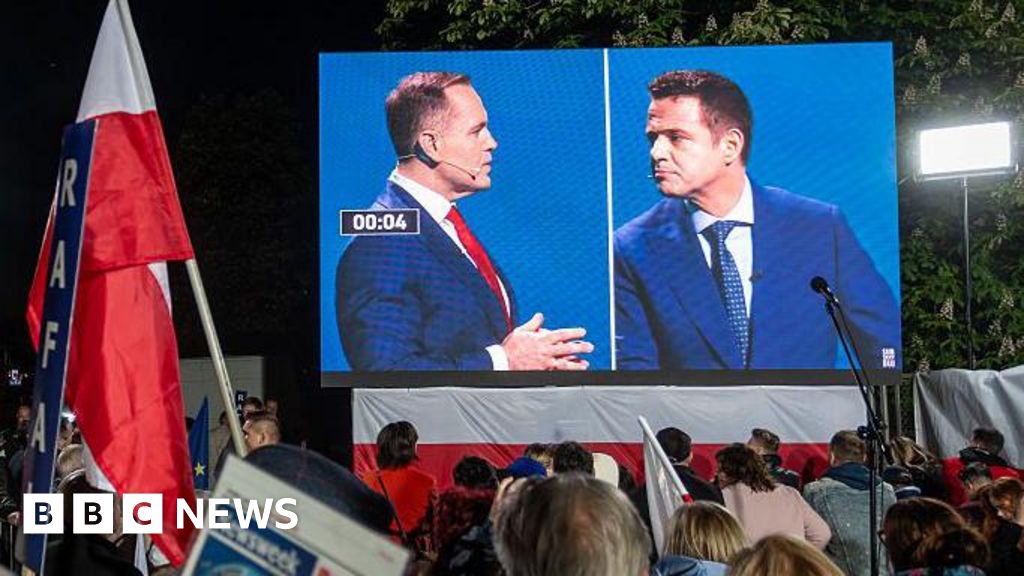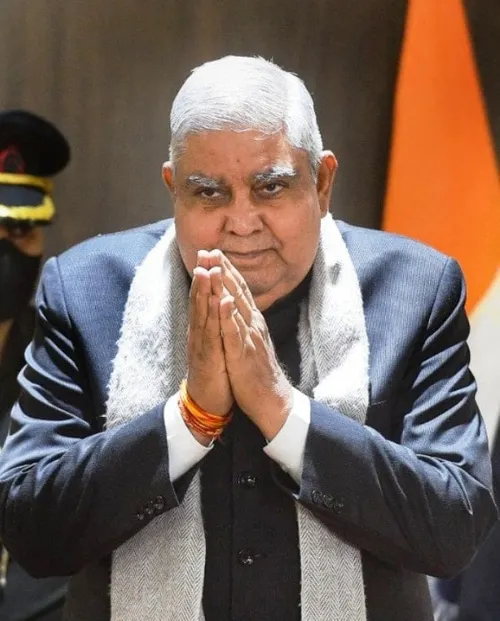BBC Warsaw correspondent
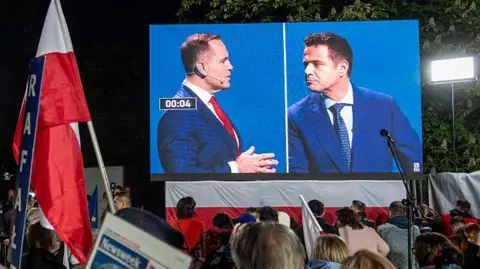 WOJTEK RADWANSKI/AFP
WOJTEK RADWANSKI/AFPWhen Poles vote for a new president on Sunday, they are expected to set up a second round run-off between Warsaw’s liberal mayor Rafal Trzaskowski and national-conservative historian Karol Nawrocki.
If opinion polls are correct, that would mean a 1 June contest between candidates backed by the two parties that have dominated Polish politics for the past two decades, a domination some voters say they’re fed up with.
Trzaskowski, the current front-runner, is deputy leader of prime minister Donald Tusk’s centre-right Civic Platform (PO).
Nawrocki, currently polling between 4%-6% behind, is supported by the Law and Justice (PiS) opposition party that lost power 18 months ago.
Poland’s president has the power to veto government bills, so what happens in this election is significant.
Tusk’s coalition does not have a big enough parliamentary majority to overturn that veto, which outgoing President Andrzej Duda, a former PiS member and ally, has used on several occasions.
That barrier may now fall as Duda cannot run again after serving two consecutive five-year terms.
Observers outside Poland portrayed Tusk’s election as prime minister in late 2023 as saving liberal democracy after eight years of right-wing authoritarian populism by the PiS-led government.
Critics widely accused PiS of turning public media into crude propaganda for its conservative Catholic worldview, politicising the civil service and judiciary and punishing judges who dared to oppose the reform.
But Tusk’s coalition government has also used questionable legal methods to wrestle back control of the public media.
Tusk has suspended the right for migrants arriving on the border with Belarus to apply for asylum and failed to deliver many of his campaign promises such as liberalising the country’s strict abortion law.
“This is not the triumph of liberal values. It’s a choice between a stupid and authoritarian right-wing populism and a hypocritical, and in my eyes, morally corrupt liberal populism,” Konstanty Gebert, a columnist for Kultura Liberalna told the BBC.
The presidential election could be won in Sunday’s first round with more than 50% of the vote, but latest opinion polls suggest it will be decided on 1 June.
Miroslaw Kaznowski, a member of the Green party that belongs to Tusk’s broader Civic Coalition, will vote for Trzaskowski, despite some reservations.
He told the BBC: “I am disappointed the coalition government is pandering to the right-wing electorate instead of standing up for its values.”
In one of the presidential debates, the PiS-backed candidate Nawrocki, proudly brandishing a mini Polish flag, tried to embarrass Trzaskowski by handing him a small rainbow flag.
In the past, the Warsaw mayor has been a vocal supporter of LGBTQ+ rights and attended equality marches in the capital.
Trzaskowski took the flag and put it on the floor, causing left-wing candidate Magdalena Biejat to walk over, saying “I’m not ashamed of it, I’ll gladly take it from you”.
Kaznowski said: “Migration, LGBT+, women’s rights and the environment have fallen off the agenda, but we’re still at the risk of falling back to an authoritarian government that aspires to Eastern values.”
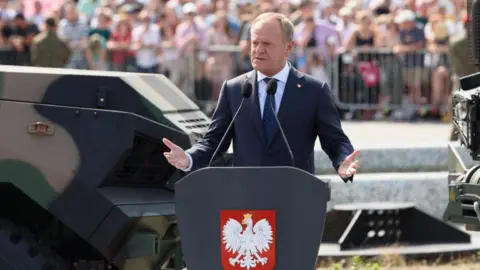 Getty Images
Getty ImagesTusk promised Polish women legal abortion up to the 12th week of pregnancy, but he has not delivered on his promise.
He presides over a broad coalition built around his own centre-right grouping that also includes smaller left-wing and conservative parties.
Disagreements within the coalition over abortion and legalising same sex partnerships stalled even before President Duda had the chance to veto them.
Following Russia’s war in neighbouring Ukraine, state security has dominated political discourse.
Foreign Minister Radoslaw Sikorski said “outflanking” PiS on security, including a tough migration policy, was key to winning the 2023 election.
This year, Poland is planning to spend 4.7% of its GDP on defence, a larger proportion than any other Nato member.
Tusk wants to offer all adult males the chance to do military training. Trzaskowski was photographed going through basic drills during the campaign.
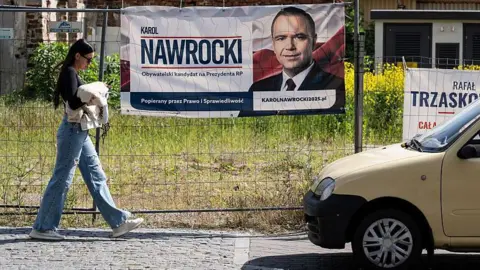 Getty Images
Getty ImagesThe liberal mayor’s tough messages on security and migration led PiS to accuse him of saying anything to win votes.
It’s a view shared by civil servant Wojciech Karlik, who plans to vote for the PiS-backed candidate, Nawrocki.
“Nawrocki will fight for Poland’s interests in the EU. He’s reliable unlike Trzaskowski who keeps changing his mind on issues like migration,” he said.
Nawrocki has come under fire recently over accusations, which he denies, that he bought a council flat from a senior citizen in poor health at a 90% discount to the market price in return for promises of assistance and care.
By his team’s own admission, Nawrocki was surprised when he lost contact with the pensioner last December. Local media reported the man had been living in a nursing home paid for by taxpayers for six months by that stage.
Opinion polls suggest the accusations have not damaged Nawrocki’s chances so far.
But the numbers indicate none of the 13 candidates will win sufficient votes to avoid a run-off between the two front-runners.
PiS, led by 75-year-old Jaroslaw Kaczynski, and Tusk’s PO are the two parties that have dominated Polish politics for the last 20 years and some voters are fed up with the duopoly.
In March, 38-year-old far-right libertarian candidate and brewing entrepreneur Slawomir Mentzen, who attracted voters, especially young men, with his anti-migrant and tax-cutting talks during his “Beer with Mentzen” meetings in small towns and cities, appeared close to overtaking Nawrocki into second place.
But his support has dropped since he gave an interview calling for the introduction of student tuition fees and a ban on abortion even in cases of rape.
Aleksandra Januszewicz, a psychotherapist, told the BBC: “I’m fed up with the stranglehold of PO and PiS. The politics I’m seeing is mostly a form of populism that plays to voters’ emotions.
“I’m not decided yet [on who to vote for], but I’m going to throw up afterwards.”
Human rights lawyer Malgorzata Szuleka agrees there is fatigue, both with the duopoly and Tusk government’s failure to deliver.
“Polish politics looks a little bit like going to McDonalds,” she told the BBC. “You go in hoping for something else and you leave with a burger and fries.
“My hope is for a president that can freeze the polarisation in the country, and we can start talking to each other again.”
Anurag Dhole is a seasoned journalist and content writer with a passion for delivering timely, accurate, and engaging stories. With over 8 years of experience in digital media, she covers a wide range of topics—from breaking news and politics to business insights and cultural trends. Jane's writing style blends clarity with depth, aiming to inform and inspire readers in a fast-paced media landscape. When she’s not chasing stories, she’s likely reading investigative features or exploring local cafés for her next writing spot.
